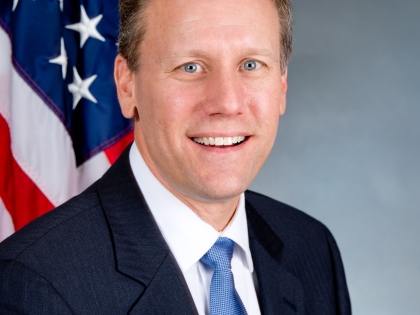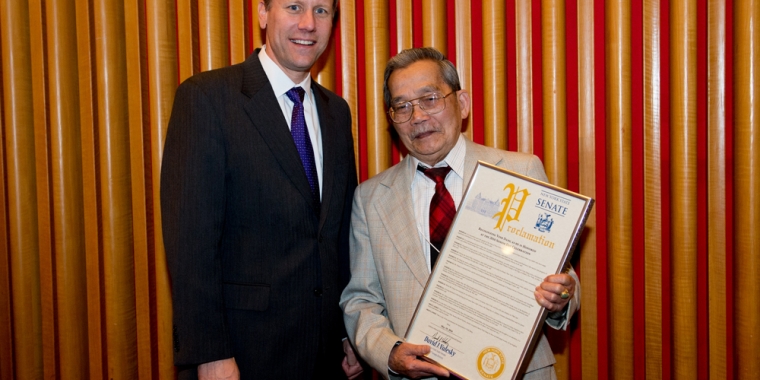
Historic Land Bank Bill Passes State Senate
David J. Valesky
June 20, 2011
Land Banks are a Long-Term Solution to Problem of Vacant Properties
Senator David Valesky (D-Oneida) announced the unanimous passage of legislation (S663A) he sponsored in the State Senate that would allow for the creation of land banks in New York State.
Land banks, entities that take control of problem properties and then redevelop or dispose of them in a manner consistent with the public’s interest, are a proven strategic tool for cities and counties where the number of vacant properties outpaces the private market’s ability to deal with them. Companion legislation passed the Assembly on Friday.
“The large number of abandoned and vacant properties is a major issue in upstate cities like Syracuse, adversely affecting property values and hindering economic growth,” said Senator Valesky. “Land banks are a community-based solution which has shown great benefit in other states, fostering growth and improving the quality of life in our cities and neighborhoods.”
“The volume of available housing stock in Western New York has simply overwhelmed our ability to manage it,” Assemblymember Sam Hoyt (D-Buffalo, Grand Island), Assembly sponsor of the legislation, said. “It’s time to get a handle on the inventory that exists and start imagining ways to creatively reuse and redevelop that space. A network of land banks gives us the mechanism for doing exactly that.”
The bill allows cities and counties across the state the ability to develop land banks, which would be tasked with converting vacant, abandoned or tax-delinquent properties into productive use. These vacant properties could be redeveloped or resold in order to better balance the supply of buildings with the local demand for them. The land banks would operate under the New York State Urban Development Corporation. Many Upstate cities suffer from an overgrowth of vacant and abandoned properties, a problem that is also beginning to creep into suburbs. In the City of Syracuse alone, there are approximately 1,800 of these properties.
“Land banking will create more opportunity and flexibility to turn blighted properties into performing assets,” City of Syracuse Mayor, Stephanie A. Miner, said: “The Senate and Assembly have taken an important step in giving Central New York, particularly Syracuse, a tool that will ultimately help combat crime, diminishing property values and other problems associated with vacant properties. I commend and thank both bodies for supporting this innovative initiative.”
“Derelict buildings not only reduce property values and diminish quality of life, they discourage investment and serve as barriers to economic and community development. A land bank authority will enable a strategic approach to acquiring and repurposing commercial and residential properties, based on market potential and community needs,” Robert M. Simpson, President of the CenterState Corporation for Economic Opportunity, said. “I commend Senator Valesky, Assemblyman Hoyt, and the rest of the leadership in the Legislature for their efforts to enact this important legislation for New York State.”
In crafting the legislation, Valesky and Hoyt carefully studied the success story of land banks in Flint, Michigan, an old manufacturing town where jobs have disappeared and vacancy abounds. The Genesee County Land Bank, which deals with Flint and its surrounding towns, was enacted in 1999 and has become the primary vehicle for redeveloping the area’s vacant housing. Both worked with Dan Kildee, from the Center for Community Progress who was an instrumental part in creating Flint’s land banks.
“I’m enthusiastic about the great potential I see for land banks in New York,” Kildee said. “Around the country, as communities face the fallout of a changing economy and the foreclosure crisis, land banking is giving local governments the chance to help reset the real estate market and promote sound development plans for the future. I congratulate Senator Valesky, Assemblyman Hoyt and the people of New York for making this reform and I’m confident that they’ll begin to see positive changes in their communities as a result.”
Peter Baynes, Executive Director of New York Conference of Mayors, said: “New York has long needed to address the reckless real estate speculation that is an unintended byproduct of the tax foreclosure process, frequently putting property in the hands of neglectful owners who have little interest in redeveloping or even maintaining the property they purchase. Land banks have proven to be an integral tool in not only halting this harmful practice, but actually reversing the decades-long trend of property neglect, vacancy and abandonment.”
Share this Article or Press Release
Newsroom
Go to NewsroomPhyllis Mills Creamer
May 20, 2016

Linda M. LeMura
May 11, 2016

Sen. Valesky Honors Senior Citizens
May 11, 2016

